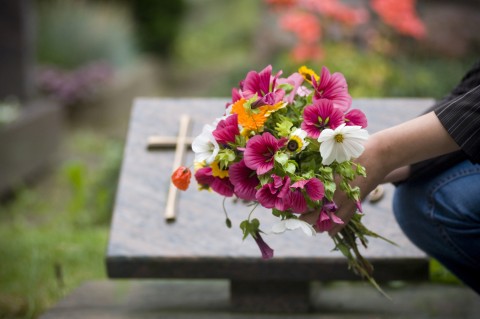The silence that surrounds parents’ grief for a baby
“It’s the absolute worst when this happens,” says the man laying gravestones, unable to speak the words baby or dead.

He and I stare down at the freshly laid gravestone, edged by spring-green grass.
“When people come into our office for this,” he trails off, shielding his eyes from the morning sunshine, his weathered face suddenly young in disbelief.
“It’s the absolute worst when this happens,” he shakes his head, unable to speak the words baby or dead in the same sentence.
I nod. I can say anything; I have already baffled him with my sunny cheer, interrupting his silent, solitary task by jumping out of a minivan full of (living) children to ask if the gravestone he is laying is for my twin daughters, who died shortly after they were born. When you start having a Strange Conversation with a Stranger, you can say anything and it is marvelously freeing.
(It wasn’t theirs. There is another baby buried next to them now; she lived two months. My mind calculates the math every time; dates are codes in this terrible club.)
“It’s not like Grandma who got 80, 90 years, lived a full life,” he continues, waving a heavy hand toward his mud-splashed truck. Two more markers lie nestled in the bed, each bearing two names (until death do us part, and even then we share the stone), waiting to be lowered by his small crane. “It’s just—it’s terrible.”
He works with death each day, 9-to-5. His job is to translate love into stone, to dig up soft earth and lay down hard granite. Memory carved into rock for centuries to come. Still he cannot bring himself to speak of what it means when a baby dies.
I have long thought this about infant death, even before my twins died. We shove it to the side, push it to corners of cemeteries, cover it with pity in hushed conversations, shudder at the strange ones who still talk about dead babies decades later. We bury it down not because it is so small, but because it is terrifyingly huge. A whole life swallowed up by death at its beginning.
For wherever we stand to consider the stark reality of the youngest dying, we ourselves have had decades of living to look back on. To imagine all evaporated in an instant—every first kiss, home-cooked dinner, summer thunderstorm, family party, tear-streaked laughter, lakeside sunrise, new job, wedding toast, newborn grandchild, fireworked sky, fresh snowfall, Christmas morning—is so overwhelming that we race from the thought as fast as we can.
They lost a baby, we whisper. No: they lost a child, a teenager, an adult, too. They lost everything at once.
I was the strange one that morning. I drove away and left him to his quiet task, his daily works of mercy. As fields rolled past, young and green and beginning, his faltering words carved absence into my thoughts.
It’s the absolute worst when this happens. His fear and reverence shook me. A validation of my own life’s unraveling; a yawning abyss into which I might fall again, if I only consider the enormity.
I don’t know how they did it, strangers comment, shaking their head to break the somber spell of sorrow. I can’t imagine the strength those parents have. We don’t know either. Would it make you feel better to know that?
But we never had the chance to choose. Getting through grief meant life or death, and we already had enough of death. Any strength came from simple repetition: another morning, the child is still dead, rise and eat, rinse and repeat.
I don’t know how we go on, I only know that we go on.
A few months ago I spoke to a gathering of women of all ages. After the talk, they came up to me one by one. From their mouths poured stories of babies lost. Miscarriage after miscarriage when no one helped. Stillborn sons and daughters whisked away by doctors. To a person, those women could tell me how old their babies would be right now. Half a century later.
If there is one truth I could impress upon the soft ground of your heart as you read hard words, it would be this: grief whisked away or buried in corners or muffled in whispers or shamed into silence does not shrivel up sooner. It grows in the darkness until it seeps out the edges.
So speak their names, send a card, remember their dates, count them in the family’s number—do any small thing to honor the enormity of their parents’ loss. Let the air of love breathe ’round the wound if there is to be any hope of healing.
And this, too: honor the startling wonder of your own life and those you love. The dazzling, baffling gift that all your cells conspired to keep you here this long when it could have been otherwise, a thousand different ways.
We keep their memory not in stone, not in earth, but in the flesh of hearts that remember. Grace and love, grace and love, let our pulse beat in thanks.
I don’t know how we go on, I only know that we go on.
Glory, what a heavy blessing that it is so.
Originally posted at Mothering Spirit




